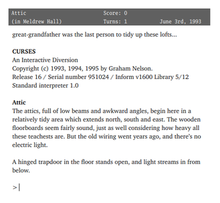C is a general-purpose programming language. It was created in the 1970s by Dennis Ritchie and remains very widely used and influential. By design, C's features cleanly reflect the capabilities of the targeted CPUs. It has found lasting use in operating systems code, device drivers, and protocol stacks, but its use in application software has been decreasing. C is commonly used on computer architectures that range from the largest supercomputers to the smallest microcontrollers and embedded systems.

Common Lisp (CL) is a dialect of the Lisp programming language, published in American National Standards Institute (ANSI) standard document ANSI INCITS 226-1994 (S2018). The Common Lisp HyperSpec, a hyperlinked HTML version, has been derived from the ANSI Common Lisp standard.
Interactive fiction (IF) is software simulating environments in which players use text commands to control characters and influence the environment. Works in this form can be understood as literary narratives, either in the form of Interactive narratives or Interactive narrations. These works can also be understood as a form of video game, either in the form of an adventure game or role-playing game. In common usage, the term refers to text adventures, a type of adventure game where the entire interface can be "text-only", however, graphical text adventure games, where the text is accompanied by graphics still fall under the text adventure category if the main way to interact with the game is by typing text. Some users of the term distinguish between interactive fiction, known as "Puzzle-free", that focuses on narrative, and "text adventures" that focus on puzzles.

Lisp is a family of programming languages with a long history and a distinctive, fully parenthesized prefix notation. Originally specified in the late 1950s, it is the second-oldest high-level programming language still in common use, after Fortran. Lisp has changed since its early days, and many dialects have existed over its history. Today, the best-known general-purpose Lisp dialects are Common Lisp, Scheme, Racket, and Clojure.
The Z-machine is a virtual machine that was developed by Joel Berez and Marc Blank in 1979 and used by Infocom for its text adventure games. Infocom compiled game code to files containing Z-machine instructions and could therefore port its text adventures to a new platform simply by writing a Z-machine implementation for that platform. With the large number of incompatible home computer systems in use at the time, this was an important advantage over using native code or developing a compiler for each system.

Script Creation Utility for Maniac Mansion (SCUMM) is a video game engine developed at Lucasfilm Games, later renamed LucasArts, to ease development on their graphic adventure game Maniac Mansion (1987). It was subsequently used as the engine for later LucasArts adventure games and Humongous Entertainment games.
BBC BASIC is an interpreted version of the BASIC programming language. It was developed by Acorn Computers Ltd when they were selected by the BBC to supply the computer for their BBC Literacy Project in 1981.
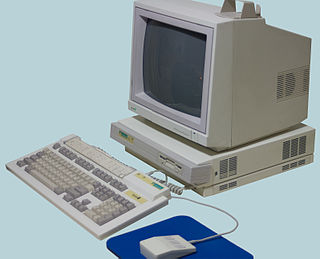
The Acorn Archimedes is a family of personal computers designed by Acorn Computers of Cambridge, England. The systems in this family use Acorn's own ARM architecture processors and initially ran the Arthur operating system, with later models introducing RISC OS and, in a separate workstation range, RISC iX. The first Archimedes models were introduced in 1987, and systems in the Archimedes family were sold until the mid-1990s alongside Acorn's newer Risc PC and A7000 models.
Inform is a programming language and design system for interactive fiction originally created in 1993 by Graham Nelson. Inform can generate programs designed for the Z-code or Glulx virtual machines. Versions 1 through 5 were released between 1993 and 1996. Around 1996, Nelson rewrote Inform from first principles to create version 6. Over the following decade, version 6 became reasonably stable and a popular language for writing interactive fiction. In 2006, Nelson released Inform 7, a completely new language based on principles of natural language and a new set of tools based around a book-publishing metaphor.
Text Adventure Development System (TADS) is a prototype-based domain-specific programming language and set of standard libraries for creating interactive fiction (IF) games.
Graham A. Nelson is a British mathematician, poet, and the creator of the Inform design system for creating interactive fiction (IF) games. He has authored several IF games, including Curses (1993) and Jigsaw (1995).
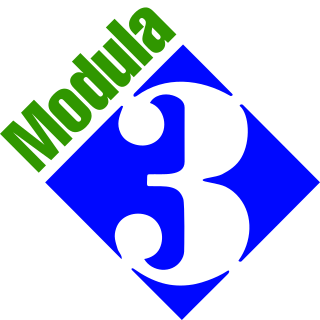
Modula-3 is a programming language conceived as a successor to an upgraded version of Modula-2 known as Modula-2+. While it has been influential in research circles it has not been adopted widely in industry. It was designed by Luca Cardelli, James Donahue, Lucille Glassman, Mick Jordan, Bill Kalsow and Greg Nelson at the Digital Equipment Corporation (DEC) Systems Research Center (SRC) and the Olivetti Research Center (ORC) in the late 1980s.
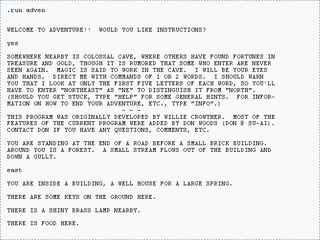
Colossal Cave Adventure is a text-based adventure game, released in 1976 by developer Will Crowther for the PDP-10 mainframe computer. It was expanded upon in 1977 by Don Woods. In the game, the player explores a cave system rumored to be filled with treasure and gold. The game is composed of dozens of locations, and the player moves between these locations and interacts with objects in them by typing one- or two-word commands which are interpreted by the game's natural language input system. The program acts as a narrator, describing the player's location and the results of the player's attempted actions. It is the first well-known example of interactive fiction, as well as the first well-known adventure game, for which it was also the namesake.
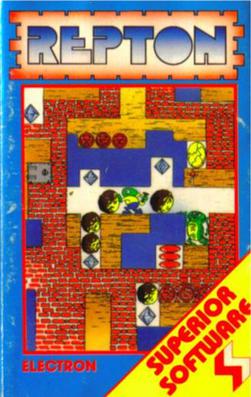
Repton is a video game originally developed by 16-year-old Briton Tim Tyler for the BBC Micro and Acorn Electron and released by Superior Software in 1985. The game spawned a series of follow up games which were released throughout the 1980s. The series sold around 125,000 copies between 1985 and 1990 with Repton 2 selling 35,000 itself. The games have since been remade for several modern systems, including iRepton for the iPhone / iPod Touch in 2010, and Android Repton 1, Android Repton 2 and Android Repton 3 from 2016 to 2018.
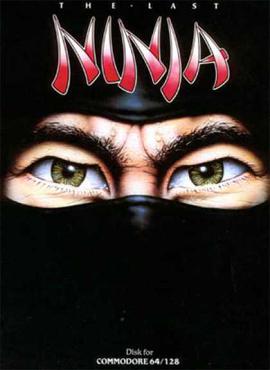
The Last Ninja is an action-adventure game developed and published by System 3 in 1987 for the Commodore 64. It was converted to the Apple IIGS, MS-DOS, BBC Micro and Acorn Electron in 1988, the Apple II in 1989, the Amiga and Atari ST in 1990, and the Acorn Archimedes in 1991.
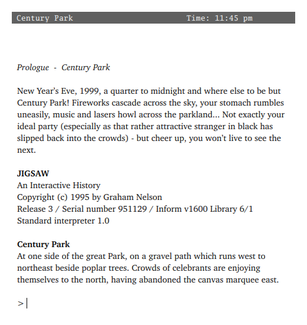
Jigsaw is an interactive fiction (IF) game, written by Graham Nelson in 1995.

3D Construction Kit, also known as 3D Virtual Studio, is a utility for creating 3D worlds in Freescape. Developed by Incentive Software and published by Domark, it was released in 1991 on multiple platforms. The game originally retailed for £24.99 for the 8-bit version, and £49.99 for 16-bit version and the 32-bit Acorn Archimedes version, in the United Kingdom. A sequel, 3D Construction Kit II, was released in 1992, but only available on Amiga, Atari ST and MS-DOS.
Brian Howarth is a British video game designer and computer programmer. He wrote many interactive fiction computer games in the early 1980s in a series called Mysterious Adventures. He was born in Blackpool in 1953.

Acorn C/C++ is a set of C/C++ programming tools for use under the RISC OS operating system. The tools use the Norcroft compiler suite and were authored by Codemist and Acorn Computers. The tools provide some facilities offered by a fully integrated development environment.
